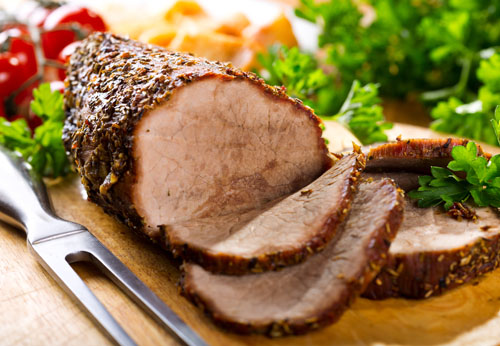News earlier this month from the World Health Organisation that processed meats cause bowel cancer, and red meat “probably” does too, sent shockwaves across the globe. There’s been a mixed response from health professionals, scientists, farmers and the general public. I for one am concerned by the response of the media and the hype across the globe pronouncing Red meat and cancer-is bad. I simply don’t believe red meat to be a catalyst for cancer.

The WHO’s International Agency for Research on Cancer (IARC) has added processed meats like sausages, ham and salami, to the same group 1 category of cancer-causing agents as asbestos and tobacco smoke. It has also classified red meat – including beef, pork, lamb and goat – as a probable carcinogen and added to its group 2A list, which also includes the active ingredient of many weedkillers.
The following are the main scientific hypotheses that have been presented by epidemiologists and medical scientists to explain the link between red meat and cancer-red meat intake and increased cancer risk. I have added my thoughts below each finding.
1. Carcinogenic by-products of cooking meats at high temperatures
When meat (red or white) is barbecued, grilled, or fried at a high temperature, chemical by-products called heterocyclic amines and polycyclic aromatic hydrocarbons are formed. Polycyclic aromatic hydrocarbons are also found in cigarette smoke and emissions from diesel fuelled-engines. Both of these have been found to be mutagenic and carcinogenic in rodents, but the biological evidence for a connection with human cancers has not been established, principally because no human cancer-inducing studies have been performed and humans have a vastly different gastrointestinal tract, immune system and liver function to rodents.
My advice: Slow cooking meats is probably the safest way to cook and consume meats. However we all know how delicious a steak is with the caramelised fatty parts!! I suggest varying how you cook your meat; enjoy the crispy, charred parts but limit that way of cooking. Add in slow cooked, roasted, stir-frying etc.
2. The use of nitrites and nitrates to preserve meats
Nitrites and nitrates are added to processed meats, such as bacon, sausages, and hot dogs. In the large intestine, these compounds react with naturally occurring amines in meat to form carcinogenic N-nitroso compounds which have been found to cause various gastrointestinal cancers in over 40 different animal species but not humans—it is inferred that it must occur in humans.
My advice: Source preserved meats without the added nitrates – they are becoming more popular and easier to find. They are more expensive but better quality.
3. Commercial hormone residues in meat
This is due to growth hormones being fed to cattle in high-intensity farming. In some countries, the use of growth hormones such as recombinant bovine growth hormone has been used to increase beef and dairy cattle productivity. It is banned or restricted in most countries.
My advice: Sourcing meats without added hormones removes this issue (it is usually only found in chickens). Buy poultry that is labelled ‘hormone free’.
4. Heme in red meat
Heme is an iron-containing chemical in red meat which gives it its red colour. While dietary iron is crucial to good health, heme is slightly toxic. Population-based cohort studies have found low-grade, but mixed-evidence, between the dietary consumption of heme from red meat and any increased incidence in cancer in animal studies—but not in human studies. The jury is still out it seems.
My advice regarding red meat and cancer.
I have seen no evidence over my 25 years of clinical studies that eating red meat causes harm to the body. I advise you to eat the best quality meat you can afford, vary the way you cook it and enjoy it!
It is also important to note, that the classifications are based only on the strength of evidence for carcinogenicity, not on the relative increase of cancer risk due to exposure, or on the amount of exposure necessary to cause cancer. For example: a substance that only very slightly increases the likelihood of cancer and only after long-term exposure to large doses, but the evidence for that slight increase is strong, would be placed in group 1—even though it does not pose a significant risk in normal use.
In my experience it is not red meat that leads some people to gastro intestinal tract (GIT) cancers, rather it is the commercial additives, flavourings, preservatives, colourants, sweeteners, herbs and spices, as well as the fast, high temperature cooking methods that we demand match our fast lifestyle, that predisposes some to GIT cancers. Added to this red meat and cancer hype is the commercial insecticide sprays that our farmers are forced to use to be commercially viable, that also contributes to GIT cancers. And in some people with compromised immune systems, it is the natural defence chemicals that plants use to defend themselves from insects, viruses, bacteria, fungi and animals that eat them, that also contribute GIT cancers.
However all of these are unlikely to ‘cause’ cancer on their own. For cancer cells to take hold, your immune system must be weakened and emotional stress has the biggest impact on your immune system. You can maintain a healthy lifestyle, minimise emotional stress and enjoy read meat whenever you like, and have processed meats in moderation.
Finally, there is a human history of eating red meats and our human immune system is well adapted to flesh foods. This is one reason you should suspect any exaggerated statements, based on ‘scientific research’ or otherwise, that suggests that eating red meats will promote cancer in your body. See the next two blog in this series Sensationalism and Reporting Medical Research and Human History of Eating Meat. If you’d like to find out more about how foods impact your health and what you can do to live a long and healthy life, come along to one of our workshops.
If you need more information about Red Meat and Cancer book check out our CLEANSE-DETOX PROGRAM.

